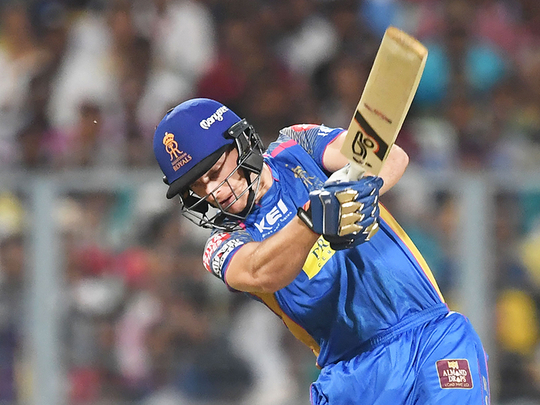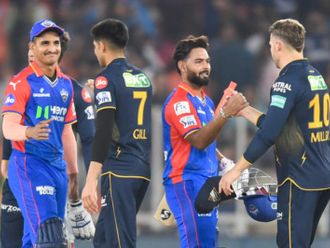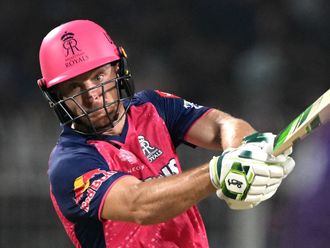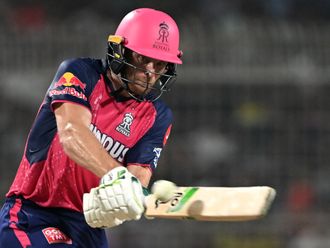
New Delhi: Jos Buttler is the first English Test player to be picked for their Twenty20 form. Then again, no Englishman has ever batted better in the Indian Premier League. Minutes after his Test recall was confirmed, Buttler pummelled 28 runs in a single over in the IPL. It embodied a fortnight in which Buttler has had the air of a schoolboy, who has unlocked the cheat codes on Brian Lara Cricket.
Each innings has been a lesson in controlled violence — a fusion of brutal straight drives or cross-batted shots like a double-handed backhand from his days as a county tennis champion, thumps through midwicket and impudent scoops.
On May 2, Buttler arrived in Delhi after a mediocre start to his IPL season, defined by middling contributions from the middle order. Then it rained. The desperation of needing 151 from only 12 overs prompted Rajasthan to bump Buttler up to open. He smote 67 from 26 balls.
What began as an ad hoc solution in response to very particular circumstances swiftly morphed into a new plan: Buttler should open, and remain there.
T20 is meant to be a game in which the vicissitudes of luck, and the risk needed to score at a high rate, preclude consistency.
Yet Buttler scored five straight fifties, equalling the record in all T20s. In the last two innings of this sequence, he made 95 not out and 94 not out, hitting the winning runs. It was one of the most stunning streaks of T20 batting in history.
Buttler departs Rajasthan having scored over 200 runs more than any Englishman has previously mustered in the IPL. This season, Buttler hit 548 runs at an average of 54.80 per innings, with a strike rate in excess of 150. Not even Ben Stokes, last year, has so towered over an edition of the IPL.
Buttler first emerged in international cricket in 2011, possessing an audacity and range of shots greater than any player to represent England — even Kevin Pietersen and Eoin Morgan. He was a player defined by ramping balls from under his nose — or even switching his hands altogether and playing what could only be described as reverse-swats. These skills lent themselves to being deployed as a finisher.
Yet that image of Buttler has not kept pace with the reality: the higher up the order he bats, the better he is. Consider Buttler’s record across his three seasons in the IPL. When he has opened, he has scored 700 runs at 58.33 apiece; when he has batted lower down he has scored 375 runs at 22.05. Indeed, as a pure finisher, CricViz’s statistics suggest that Buttler is not quite as good as his reputation suggests; since the 2016 World Twenty20, Buttler only averages 20.77 at No 5.
So opening with Buttler represents a double win: first, getting a supreme opening batsman; and second, if he does bat deep, he is also more effective in the death overs than when batting in the middle order.
Yet Buttler has opened in just a solitary game for England in T20, against Sri Lanka two years ago when Alex Hales was injured. He hit 73 not out from 49 balls.
Since the start of 2017, Buttler averages 53.55 when opening in T20 cricket — over twice as much as Jason Roy, and nearly twice as much as Hales. He is threatening to achieve the levels of consistency that would elevate him to a rarefied elite of T20 openers in history. For England to maximise their output from Buttler, and improve their poor form in T20, empowering him to shape their innings may be the next stage.
As he leaves the IPL season, Buttler is beginning to channel AB de Villiers for not just the volume of runs he is scoring, but for the style with which he is making them. “Buttler is an incredible prototype of a T20 cricketer,” observes John Buchanan, the former Australia coach. In the IPL, he has been the embodiment of a 360-degree player.
Now he has the chance to follow De Villiers in thriving across all three formats. De Villiers, the unicorn of modern batting, has a long-form record a world away from Buttler’s, but there are inescapable similarities: both have pure techniques and were supreme across a number of sports.
In recent months, Buttler seemed to be drifting inexorably to the path of white-ball specialisation — he has played only six first-class innings in 16 months, and in February said he would not lose any sleep if he never played another Test.
It is not churlish to think Test cricket might need Buttler more than he needs Test cricket.
If his selection defies the conventional wisdom that Test runs are won through first-class form, adhering to conventional wisdom has never been Buttler’s way.












